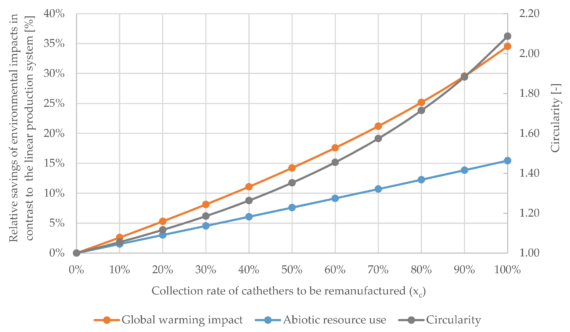A 2021 study conducted by the Fraunhofer Institute for Environmental, Safety, and Energy Technology (Fraunhofer) analyzed the environmental impacts of the medical remanufacturing of Electrophysiology Catheters. By using reprocessed catheters as an alternative to newly manufactured ones, the study revealed they reduced global warming impact by 50% and ozone depletion […]
sustainability
Sustainability is an international, peer-reviewed, open-access journal on environmental, cultural, economic, and social sustainability of human beings, published semimonthly online by MDPI. Read more…
[McKinsey & Company] Circularity refers to practices that optimize resource use and minimize waste across the entire production and consumption cycle, emphasizing sustainability and economic efficiency. Read more…
A circular economy involves maintaining manufactured products in circulation, distributing resource and environmental costs over time and with repeated use. In a linear supply chain, manufactured products are used once and discarded. In high-income nations, health care systems increasingly rely on linear supply chains composed of single-use disposable medical devices. […]
Building a More Sustainable World Yale strives to be a leader in campus sustainability. University leaders, departments and individuals all play a role in harnessing our creativity, ingenuity and desire for excellence as we come together around these efforts. Read more…
[Yale Sustainability interview] Dr. Sherman is Associate Professor of Anesthesiology at the Yale School of Medicine, and of Epidemiology (Environmental Health Sciences) at the Yale School of Public Health. She also serves as the Director of the Program on Healthcare Sustainability for the Yale Center for Climate Change and Health. […]
Reprocessing medical devices originally labeled for single use saved hospitals and surgery centers nearly $500 million in 2018, according to survey findings released by an industry trade group Monday. Read more…



